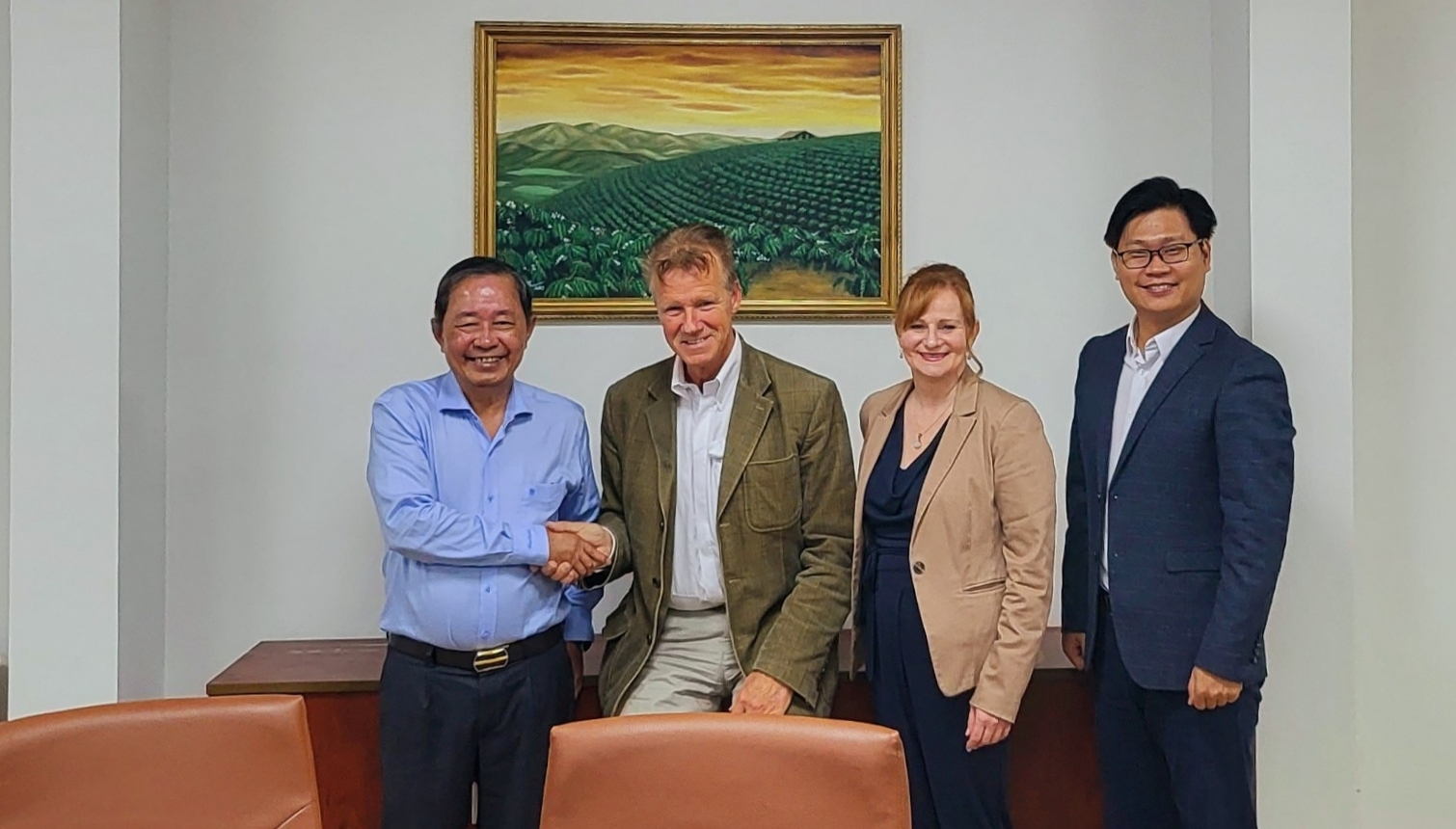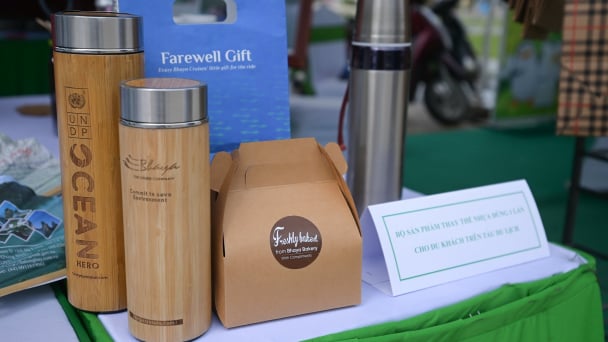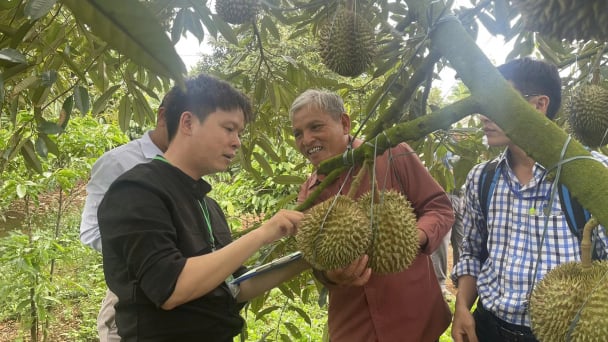June 1, 2025 | 12:04 GMT +7
June 1, 2025 | 12:04 GMT +7
Hotline: 0913.378.918
June 1, 2025 | 12:04 GMT +7
Hotline: 0913.378.918

The meeting between Nguyen Nam Hai and Dr. Cord Lüllmann in Ho Chi Minh City on June 28, 2023.
On June 28, 2023, Dr. Cord Lüllmann - CEO of the Innovation Center of Tentamus Group (Tentamus Group GmbH), met and exchanged with Nguyen Nam Hai - Chairman of Vietnam Coffee - Cocoa Association to revolve around the issue of supporting Vietnamese businesses adapt to the European Green Deal.
The European Green Deal, approved in 2020, is a set of policies that re-establish the European Commission's commitment to addressing climate and environmental challenges, which is the defining task of this generation. This new growth strategy aims to transform the European Union into a just and prosperous society with a modern economy, efficient and competitive resource extraction and use, where no net greenhouse gas emissions by 2050 and where economic growth is independent of resource use. The European Green Deal also aims to protect, conserve and enhance the EU's natural capital while protecting its citizens' health and well-being from environmental risks and impacts.
The European Green Deal will improve the well-being and health of citizens and future generations by providing: fresh air, clean water, healthy soil, and biodiversity renovated, energy-efficient buildings. healthy and affordable food.
On May 16, 2023, the European Parliament approved the European Anti-Deforestation Regulation (EUDR). Accordingly, wood and wood products, coffee, and rubber are the main export sectors of Vietnam affected when this regulation is applied. The agency also said that 2.3 billion euros from Vietnamese products exported to Europe mainly fell into coffee products (accounting for 47.5%), wood (accounting for 35.2%), and rubber (17.1%).
According to Nguyen Nam Hai, the total coffee export turnover in 2022 is US$ 4 billion (1.7 million tons). Previously, our country mainly exported green coffee with a proportion of up to 95% of output. Now the production of processed products has increased to 15%. This shows the enormous potential for increasing the value of Vietnam's coffee exports.
Hai emphasized that the European Green Deal is a challenge and an excellent opportunity for Vietnam's coffee industry. This agreement stipulates that coffee products exported to the EU cannot be harvested on cleared land after December 31, 2020. However, most Vietnamese coffee production meets this requirement, and the proof with EU consumers will bring competitive advantages to Vietnam's coffee industry.
During this meeting, Dr. Cord Lüllmann and Nguyen Nam Hai agreed to collaborate on upcoming projects to support Vietnamese coffee businesses adapting to the European Green Deal, as well as provide solutions to help Vietnam's coffee industry, has the opportunity to increase its value in the EU market.
According to Dr. Cord Lüllmann, Vietnamese coffee exporters need to communicate better with consumers in Europe because consumers will decide to consume national products that meet the requirements they expect. In the project, he proposed to connect Vietnamese exporters with supermarkets in Germany and Europe, thereby combining traceability software and isotope testing capabilities that can be identified if the batch of coffee meets the European Union Green Agreement requirements. By consulting businesses and cooperatives, Cord Lüllmann hopes to prove to European consumers that Vietnamese coffee is produced with the right amount of water and has fewer CO2 emissions… Projects like these effectively promote the image of quality and environmentally friendly Vietnamese coffee to many European consumers.
Founded in 2021, Tentamus Group GmbH is a leading German testing group with headquarters in Berlin and a presence in Europe, the UK, Israel, China, Japan, India, and the USA. Tentamus provides testing, certification, and consulting services for all products related to the human body (food and feed, pharmaceutical and medical, agricultural and environmental sciences, nutrition) and dietary supplements). The Tentamus Group is present in 23 countries, with over 4,000 technical personnel in 90 companies.
The European Green Deal is a package of policy initiatives, which aims to set the EU on the path to a green transition, with the ultimate goal of reaching climate neutrality by 2050. It supports the transformation of the EU into a fair and prosperous society with a modern and competitive economy.
It underlines the need for a holistic and cross-sectoral approach in which all relevant policy areas contribute to the ultimate climate-related goal. The package includes initiatives covering the climate, the environment, energy, transport, industry, agriculture and sustainable finance – all of which are strongly interlinked.
The European Green Deal was launched by the Commission in December 2019 and the European Council noted it during its December meeting.
Translated by Ha Phuc

(VAN) Over the past five years, Quang Ninh Province has vigorously and synchronously implemented the ‘Say No to Plastic Waste’ campaign, yielding positive outcomes in advancing sustainable tourism.

(VAN) The prevention of plastic pollution necessitates collaboration among governments, businesses, and citizens. Today's little things contribute to a future free of plastic.

(VAN) This was the directive given by Deputy Minister Phung Duc Tien during a meeting with the Department of Livestock Production and Animal Health, and relevant stakeholders to prevent and control African swine fever.

(VAN) For the durian industry to succeed, the value chain must fulfill its commitments to the government, the community, and international partners.

(VAN) Vaccinating juvenile pangasius helps reduce disease, antibiotic use, and farming costs, increasing profits for export-oriented farmers in An Giang.

(VAN) Due to a limited supply of workforce and competitive recruitment requirements, businesses struggle to retain talented veterinary human resources.

(VAN) WOAH’s guidance aims to mitigate disease risks through a One Health approach that balances economic, conservation, and public health interests.